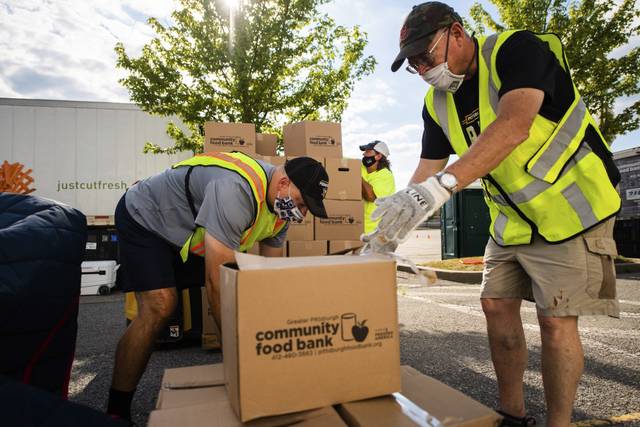https://triblive.com/opinion/ann-sanders-and-theodoros-papazekos-congress-must-boost-snap-benefits-to-address-hunger-crisis/
Ann Sanders and Theodoros Papazekos: Congress must boost SNAP benefits to address hunger crisis

The economic downturn accompanying the pandemic has cost millions their jobs, and millions more have faced reduced hours and wages. The problem is perhaps particularly acute in Pennsylvania. As of June, our state unemployment rate of 13% was the ninth worst in the country and far worse than its peak of 8.7% during the Great Recession. Only 10 of the commonwealth’s 67 counties have unemployment below 10%, and numbers could rise even higher.
For the roughly 40% of Americans who can’t afford to pay for a $400 emergency, a surprise layoff or medical bill takes food off the table. Coupled with increases in food prices — up nearly 5% across the board and 13% for meats and proteins over the last year — it’s no wonder so many are having a hard time scraping together enough to eat.
Pennsylvania, like the rest of the country, is facing widespread food insecurity at historic levels. The share of households who report that “the food (they) bought just didn’t last and (they) didn’t have money to buy more,” has nearly doubled since 2018, the last year with available USDA data. About 22% of households were food insecure in April, a figure that rose to 35% if that household included children. Nationwide, those figures represent more than 72 million Americans — and 26 million children — without enough to eat.
Both the current pandemic and past food insecurity disproportionately affect people of color, who face structural racism in health care, housing, education, transit and food access. The effects on food security are staggering. Black and Hispanic households face food insecurity at rates approaching and surpassing 30%, some 10 points higher than their white counterparts.
It is precisely those already struggling — disproportionately families with children, households with disabilities and people of color — who have been left behind by the previous covid-19 response bills passed by Congress. Not only did the previous SNAP adjustment, Emergency Allotments, leave out the poorest SNAP users, it hasn’t been extended past July — which coincides with the end of the $600 weekly unemployment payments that are keeping families afloat.
At both Just Harvest and the Coalition Against Hunger, we field calls daily from those seeking food assistance. Some call so we can help them apply for SNAP; others — many who have exhausted their benefits for the month — call to find a food pantry.
Maya (name changed to preserve anonymity), a West Philly single mom of four children, is one of those callers. With her kids home from school, she found herself forced to rely on her mom and local food banks — even with the maximum SNAP benefit. Maya is one of millions of parents forced to skip meals to ensure their kids eat. In August, she says, without the extra benefits, things will only get worse.
“If I were allotted more SNAP benefits, I wouldn’t have to sacrifice me eating just to make sure my kids have good portion sizes during mealtime,” she told us. “I wouldn’t have to rely on my mom or food banks if SNAP benefits were increased.”
In the face of such an enormous crisis, Congress has a moral obligation to ensure the most vulnerable Americans have food on their tables. The best way to do that? Increase SNAP benefits by 15%. The HEROES Act passed by the House two months ago includes this temporary increase in response to the pandemic. That means families like Maya’s could afford to eat — the increase is a modest but meaningful amount of about $25 per person each month — enough to combat health risks and lessen reliance on overburdened food banks.
Even people who don’t get SNAP would benefit. Increasing SNAP has proven to be an incredibly effective stimulus during a recession. Every dollar spent on SNAP boosts the economy by $1.70. And unlike other stimulus options, SNAP’s impact is immediate: 97% of SNAP benefits are spent within a month, infusing dollars in local supermarkets and supporting jobs.
America is facing a hunger crisis to match our public health and economic crises, but Senate leadership has made clear it will not pass the HEROES Act. As high stakes negotiations will in the Senate continue, we want to make one thing clear: Millions of Americans like Maya and her kids need the temporary 15% SNAP boost just to survive. The Pennsylvania Congressional delegation simply cannot allow a third bill to pass without it.
Pennsylvania’s struggling families are counting on them.
Ann Sanders is a policy advocate for Just Harvest in Pittsburgh. Theodoros Papazekos is a policy intern for the Greater Philadelphia Coalition Against Hunger.
Copyright ©2026— Trib Total Media, LLC (TribLIVE.com)
